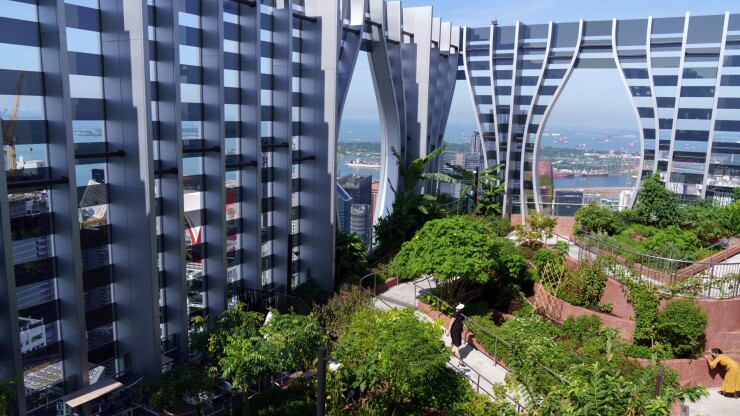
Rules for digital assets are a
All three firms are headquartered in the U.S. and continue to operate in the U.S., but have been able to move faster in Singapore due to rules that are more specific to digital assets, providing a roadmap for how these assets can be used for payments.
"Singapore stands out due to its regulatory clarity and proactive approach to responsible digital asset regulation," said Yam Ki Chan, vice president of strategy and policy for Circle. "This provides a level of confidence that may not always be present in other markets for banks, financial institutions, merchants and users. Singapore's well-established financial infrastructure and global connectivity make it uniquely positioned for digital-asset integration."
The licenses enable companies to provide digital-asset payments in Singapore and fall under MAS regulations for stablecoins, cryptocurrency, central bank digital currencies and Web3 payments such as NFTs and the metaverse.
For example, under local regulatory guidance, Circle recently partnered with Singapore-based ridesharing firm Grab, which is integrating Circle's Web3 Services platform in the Grab app to test digital asset transactions in Singapore. "We want to accelerate adoption of blockchain as more developers and companies transition to Web3," Chan said.
Singapore's stablecoin rules
While cryptocurrency regulations are still developing in the U.S., Singapore established its own rules years ago. The
Singapore's stablecoin rules stipulate that coins must be backed by low-risk liquid assets such as U.S. dollars or Singapore dollars that must exceed the value of the stablecoin at all times. Issuers must be able to return the value of the digital currency to holders at par within five days of a request, and must disclose audit results.
These rules cover many of the
"Singapore has a relatively mature and developed financial sector, as well as a clear and progressive regulatory framework for digital assets including digital payments," said Kok Kee Chong, CEO at AsiaNext, a digital-asset marketplace based in Singapore. "It is also a hub for fintech innovation."
Chong referenced the
AsiaNext, which is a joint venture between Japanese fintech SBI and Switzerland's SIX stock exchange, received a Recognized Market Operator License from MAS in September, enabling AsiaNext to provide trading, post-trading and other capital market activities for digital securities and funds in Singapore. AsiaNext has also applied for a license as a Major Payment Institution as part of a plan to diversify into other financial services.
"Development and deployment of distributed ledger and blockchain use cases will depend on legal and regulatory clarity in each jurisdiction," Chong said. "Countries that are embracing central bank digital currencies and are more supportive of stablecoin issuances can enable the integration of traditional assets and the Web3 community."
Coinbase did not provide comment for this article.
Global competition
Ripple has long had an adversarial relationship with U.S. regulators, including a
In an email, Ripple's public relations office said Singapore's regulators have "demonstrated a sophisticated depth of understanding for the nuances of different forms of digital assets and their various use cases. The lack of regulatory clarity in the U.S. allows other markets such as Singapore, London, Hong Kong and Dubai to capitalize on fostering a welcoming environment for the industry."
Ripple said the Singapore payments license will help it expand digital-asset payments in markets with similar regulations. Ninety percent of Ripple's business comes from outside of the U.S. The firm is engaged with stablecoin and central bank digital currency projects in a
"Other economies are now seeking to evolve the Singapore model by putting in place regulatory frameworks for digital assets. Over the past year, we have seen increasing regulatory clarity for digital assets in Europe, Japan, and parts of the Middle East. We expect more to come," Chan said.
Circle's Chan did not draw a contrast between Singapore and U.S. regulations, but did say, "clear, pro-innovation, and reasonable regulatory framework enhances trust amongst users and investors, brings in reputable companies and responsible innovation, and enhances long-term competitiveness."
Regarding the U.S., Chan said: "We continue to hold regular conversations with policymakers around the world on a responsible and pro-innovation regulatory framework for stablecoins."
Competition or arbitrage between different regulatory regimes is happening for many economic activities, and is particularly consequential for the development of stablecoins and cryptocurrencies, said Eric Grover, a principal at Intrepid Ventures.
"The longer the U.S. patchwork of federal and state regulation of digital currencies remains unclear and the more burdensome it is, the greater the incentive for stablecoin and cryptocurrency businesses to seek and locate in more favorable jurisdictions abroad," Grover said, adding that businesses like hair salons and funeral homes are intrinsically local and therefore have a tougher time avoiding costly regulation. "In contrast, digital currencies have more latitude in organizing to avoid or minimize taxing, unclear, or capricious regulation."






